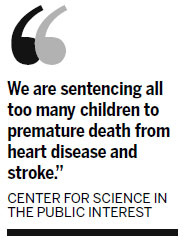Report: US kids eat too much salt
CDC warns sodium intake mostly from processed, restaurant food
US children are eating far too much salt, mostly from processed foods, putting them at risk of high blood pressure and heart disease later in life, federal health officials said on Tuesday.
A report from the US Centers for Disease Control and Prevention found that more than 90 percent of US children ages 6 to 18 consume too much sodium daily.
Those children eat an average of about 3,300 milligrams of sodium daily even before salt is added at the table, according to the CDC study, That exceeds dietary guidelines calling for less than 2,300 mg per day. The study was based on national surveys in 2009 and 2010.
"The dangerously high levels of sodium children are consuming demand action from the Food and Drug Administration," said the Center for Science in the Public Interest, a consumer group. "We are sentencing all too many children to premature death from heart disease and stroke."
The CDC noted that one-in - six young US citizens already has elevated blood pressure - a condition closely linked to high sodium intake and obesity, which can lead to heart attacks and stroke.

The report found that 43 percent of the sodium came from 10 popular types of foods, including pizza, sandwiches, processed and cured meats, pasta with sauce, cheese, salty snacks like potato chips, chicken nuggets and patties, tacos, burritos, bread and soup.
"Most sodium is from processed and restaurant food, not the salt shaker," CDC Director Tom Frieden said in a statement. "Reducing sodium intake will help our children avoid tragic and expensive health problems."
"Too many children are consuming way too much sodium, and the result will be risks of high blood pressure and heart disease in the future," he said.
Lunch and dinner tended to be the saltiest meals of the day, said the report.
"Most sodium is already in food before you buy it or order it. About 65 percent comes from store foods, 13 percent from fast food and pizza restaurant foods, and 9 percent from school cafeteria foods," he said.
Parents and caregivers are urged to give children wholesome, unprocessed foods as often as possible, the CDC said in a statement.
Reuters-Xinhua-AFP
(China Daily 09/11/2014 page11)














